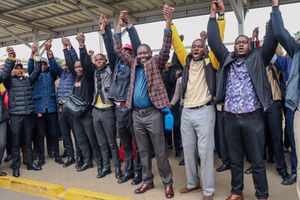Parents oppose privatisation of Kipkeino Primary School

A teacher uses the chalkboard during a lesson. Parents with children at Kipkeino Primary School in Eldoret have opposed plans by the owners and managers to privatise the learning centre.
What you need to know:
- A section of parents who spoke to Nation.Africa on condition of anonymity, citing fear of victimisation, accused the family of legendary athlete Kipchoge Keino of managing the school as a family property.
- Yet, according to them, the school is benefiting from Free Primary Education (FPE) funding as well as textbooks from the government.
Parents with children at Kipkeino Primary School in Eldoret have opposed plans by the owners and managers to privatise the learning centre.
The angry parents on Thursday said that they had invested a lot in the 25-year-old school by paying huge school fees between Sh100,000 and 160,000 per year to develop current infrastructures at the school.
A section of parents who spoke to Nation.Africa on condition of anonymity, citing fear of victimisation, accused the family of legendary athlete Kipchoge Keino of managing the school as a family property.
Yet, according to them, the school is benefiting from Free Primary Education (FPE) funding as well as textbooks from the government.
“For a long time, this school has been serving us as a public school, and as parents, we took the pain of paying huge fees knowing that the school is a public institution and our role as parents was to help in developing it,” said one of the parents on anonymity.
The parents are accusing senior education officials both from the national government and county of being silent about their concerns about the management of the school yet it is a public school.
They said they had written several letters to the Ministry of Education to address their concerns in vain.
“We have raised our concerns to various government institutions, but they have chosen to remain silent,” said a parent representing one of the classes in the school.
"The school registration certificate in our possession indicates that the school was registered as a public school on January 3, 2001, by the Ministry of Education with registration no G/PE/0011/2001 as a public primary school," the parent said.
A meeting that was called by the management to inform parents about the change of ownership ended prematurely.
The family of Mr Kipkeino insists that the school has never been a public school, yet it was benefitting from public funding including government of Kenya textbooks meant for public schools.
Through documents presented to Nation.Africa, the family said the school was registered as a private learning centre after the family purchased the land hosting the school in 1987.
According to the family, the land on which the school is built is private, and the title deed was under Phyllis Keino, title number: Kiplombe/Kiplombe Block 5(Kaptich)/66 (now under Lewa Children’s Home Trust).
The family has maintained that Kipkeino School occupies 30 acres within the above-mentioned title and not 200 acres as claimed by the parents.
The family said that in 1987, the Kipkeino family sought approval from the District Education Office in Uasin Gishu District, to establish a school in aid of the registered charity: Kipkeino Children’s Home (that is now known as Lewa Children’s Home) with the vision of educating children within the community, while delivering quality education for both the vulnerable children at the Home and Community at large.
“Kipkeino family and friends, both locally and internationally, pooled private resources through donor support to aid the vision of a quality education for all children,” stated the document presented to Nation.Africa by Andrew Kiptoo, one of the family members of the Kipkeino family also a board member of the school management.
Upon registration, the Government of Kenya provided teachers to Harambee schools as well as charitable-organisation schools, and since Kipkeino School was part of a registered charitable organisation, the school qualified and received TSC teachers from then to date,” said Mr Kiptoo.
Later on, he said the Education office in Uasin Gishu advised the school to re-register as a public school to facilitate the deployment of TSC teachers.
Despite parents' claims that the school is benefitting from FPE and free textbooks from the government, the family has maintained that the school has never received any development funds from either the Constituency Development Fund (CDF) or any fundraising conducted by parents of the school.
“The school has only been receiving funding from Lewa Children’s Home Trust and the Keino family for further school development and not the government,” said Mr Kiptoo.
Mr Kiptoo said they decided to go private to allow the family to fully manage the affairs of the schools without depending on TSC teachers but instead employ their own
A month ago, the Ministry of Education received an application to convert the school from its current public status to a private institution.
A public notice in Daily Nation indicated that the Ministry of Education invited feedback from the public, institutions, and organisations that may have objections or comments on the proposal to privatise the school.
“Those with concerns have 14 days from the date of the public notice to submit their input either in writing to the school administrator or via email,” stated the notice.
It is this notice that provoked parents' anger claiming that they were shocked to see the advert without consultation through public participation as it is required by the public when it comes to privatising public property.
“I oppose the Strongest terms possible. I believe it was built through Public funds,” said Mr Noah Arap Sing'oei, a resident of the area.
Another shocked resident of the Jua Kali area where the school is located claimed that cartels wanted to grab the school.
"This is Kenya and we know there are cartels who are up to this, what is the need to change? There is still enough land for those who want to engage in the private sector to do so. Just leave alone public entities. If there are few or no learners then it can be reutilised maybe to a county hospital,” said Mr Edward Kipchirchir from Turbo where the school is located.
Uasin Gishu County Education Director John Thiringi confirmed that the process of privatising the school has been ongoing since 2014. Mr Thiring who did not want to divulge more information about the process said the law allows such a process.
“This process has been going on for some time and it has to follow all legal requirements under the law,” said Mr Thiringi.
According to Section 43 of the Basic Education Act No. 14 of 2013 which categorises Public schools as private schools is that a public basic education institution cannot be converted into a private basic education institution or any other private status without consultation with the National Education Board and approval by the Cabinet Secretary.





